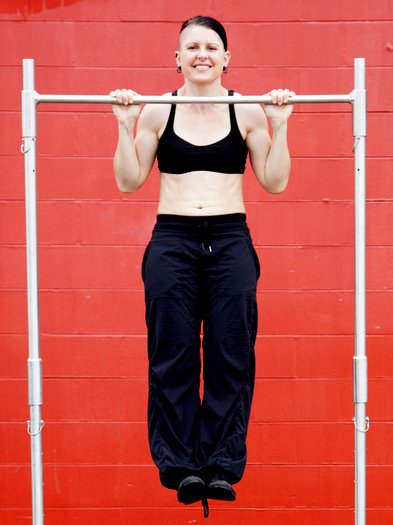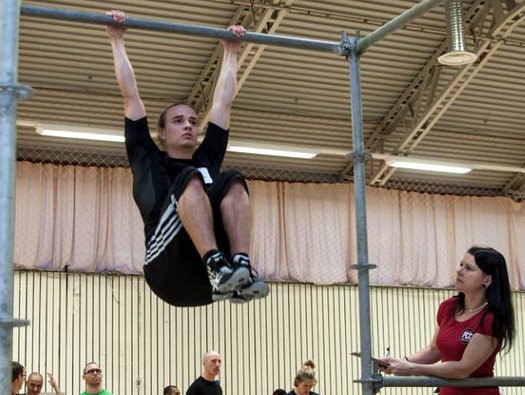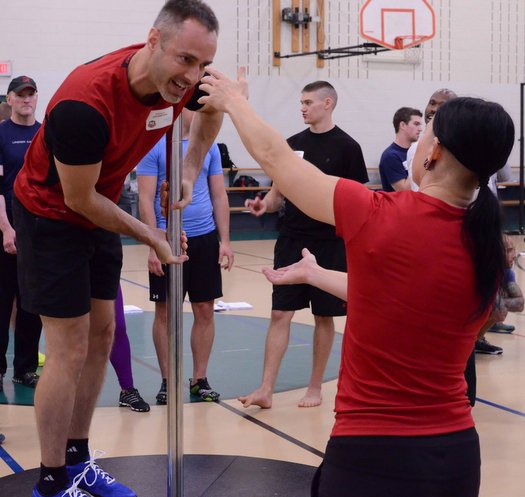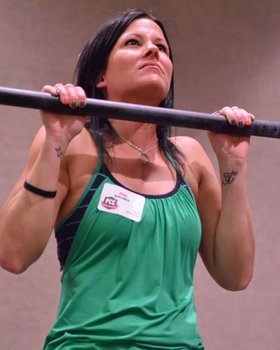
While we’ve shared a lot of information about what happens at PCC workshops, there are always still questions revolving around the same couple of topics: How do I prepare for the Progressive Calisthenics Certification, and is the PCC right for me?
Unlike many certification workshops in the modern fitness world, the PCC is a highly physical three-day workshop AND it has a strictly judged physical test (The Century!) to ensure you’re fit to present yourself to the world as a PCC Instructor. While this can seem daunting, there are some clear-cut strategic approaches which can help you both be prepared to pass the test, and be physically (and mentally) prepared to really get the most out of your PCC experience. (Be sure to click here for Paul Wade’s excellent PCC Q+A article written in January of 2013 which I hope you haven’t missed.)
One of the things I like most about The Century is that it’s a balanced test. While the numbers may not look frightening, having to perform each rep to our standards for the required number can prove to be challenging to say the least. I’ve personally seen very fit, very experienced people who were well prepared for the test need to take a second to mentally reset between exercises in the midst of testing.
Practicing the basics to the point that they are second nature is not only great for testing, but is also helpful for situations where you find yourself having to instruct a large group of people, or multi-task in some way while troubleshooting a client or student’s technique. In other words, performing the exercises during testing can tell us how you might perform as an instructor and leader. Not to mention, the testing occurs after three days of exhilarating and fun physical learning!

We usually have to remind especially inspired attendees not to go to complete failure while they are trying out some of the progressions we present during the workshop. It is hard after you get that first muscle-up to slow down and not immediately get back up on the bar for the 2nd, 3rd or 4th attempt at another. I’ve seen guys so overjoyed at their own progress after getting a game-changing cue from Al, Danny or myself that they’ve shredded up their hands while practicing it over and over again. (Yikes!)
Someone preparing for the PCC should really have two goals, passing the Century test is the more obvious of the two, but the other goal should be a focus on general strength, skill, and volume. The volume will also help prepare your body (and hands) for spending more time on the bar, pole, or floor. Suppose your most favorite (and/or most challenging) exercise falls on the 2nd or 3rd day? You will want to have as much strength and mobility at your disposal for trying as many of the progressions as possible—especially since the PCC instructors and your fellow attendees will be there to help you past any sticking points.

When mentioning this particular topic, people often voice concerns that they think we will be doing muscle-ups and front levers 8 hours a day for three days in a row. Don’t be intimidated by the range of material the workshop offers, but do be prepared to attend at your best.
Also, I hope that you will bring us questions and moves you’ve been struggling with—we can help you work on them, and at the same time, the other attendees benefit from seeing how a given issue can be resolved. This is incredibly helpful for everyone’s own practice as well as that of their clients. I try to bring up stories of how either my clients or I overcame an issue so that others can try the approach too. So bring your strengths, but bring your “weaknesses” too.
By preparing for the Century, you will be drilling yourself well for the basics, which is often the most important aspect of being a professional trainer. While we would all love to be constantly coaching others on extremely advanced exercises, the reality is most of our clients will be everyday people who will need to start out at the very beginning. While many of us have long since progressed from the initial steps in Convict Conditioning (the basis of the PCC) and are slowly approaching the master steps, we need to remember how to really drill down and help someone who is just starting out. Often, beginners bring restricted movement patterns that can prove perplexing to an instructor who isn’t fully prepared.
It’s easy for us to be tempted to skip over that “easy stuff”, but I always remember an attendee at one of the very first PCC Workshops who was incredibly fit and able to do rep after perfect rep of “regulation” push-ups. But, when working through the progressions he was unable at first to correctly demonstrate a push-up from the knees. Fortunately with some attention to detail, and activation of the abdominals and glutes, he was not only able to demonstrate a knee push-up that would truly help a beginner, but he was able to progress further with his own push-ups because of this extra knowledge and experience. Similarly, when I get stuck on a given progression I go back and make sure I’m not taking my own strength for granted, simply because I’m able to “muscle through” a particular move.
The great thing about the PCC is that ALL levels of the progressions are useful—no matter your client’s fitness level. So, getting proficient with the Century Test is a crucial task, as is working up to a volume level that will allow you to fully participate in the workshop.

While we’ve seen a trend towards more men attending than women, everyone who has come to the PCC has been able to fully participate and learn from the experience. Women often ask me if I think they should “even bother” signing up, because somewhere along the line a rumor must have gotten started that we’re going to be doing backflip muscle-up spinaround jump squats (don’t ask me how to do that, I just made it up for emphasis) for three days in a row. But, the women who have shown up to past PCCs have not only thrived at the workshop but always seem to surprise themselves. Similarly, women with training backgrounds not as grounded in raw bodyweight strength often discover a whole new world of training to explore. As I’ve said many times before, if you understand the principles, you can really coach anyone—even people who have different strengths than your own.
The real treasures of the PCC are not just being able to perform or work towards performing cool moves and exercises, it’s being able to break down the movements for any situation. If there’s a common thread I’ve noticed among past attendees of the PCC workshops it’s a willingness to try new things, an innate form of leadership, and an intense desire to help others.
The PCC is an instructor course, and while many people do attend for their own knowledge (which we think is fantastic, by the way) we do find out that after a while those same people can’t help but share the information with others.
The world needs this accessible do-it-anywhere route to fitness, as well as instructors of all shapes, sizes and abilities to lead the way. I hope to see you bring your “A Game” to an upcoming workshop!
***
About Adrienne Harvey, Senior PCC Instructor, RKC-II, CK-FMS, Primal Move Nat’l Instructor: Originally RKC Certified in 2010, and RKC Level 2 certified in 2011, kettlebell and bodyweight training have been crucial in Adrienne’s personal quest for fitness. A core member of the PCC team, Adrienne loves sharing her knowledge with small groups and individuals. She also loves to develop recipes and workout programs to further support performance, body composition, and of course—FUN. Go to http://www.giryagirl.com for more information about Adrienne!
